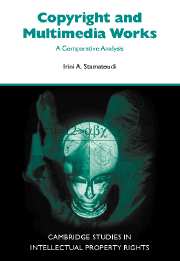Book contents
- Frontmatter
- Contents
- Acknowledgments
- List of abbreviations
- Introduction
- 1 Placing multimedia products within the scope of copyright
- 2 The scope of multimedia works
- 3 Traditional literary works
- 4 Collections and compilations
- 5 Databases
- 6 Audiovisual works
- 7 Computer programs
- 8 Video games as a test case
- 9 Multimedia products and existing categories of copyright works
- 10 A regime of protection for multimedia products
- 11 Conclusions
- Postscript
- Bibliography
- Index
4 - Collections and compilations
Published online by Cambridge University Press: 25 July 2009
- Frontmatter
- Contents
- Acknowledgments
- List of abbreviations
- Introduction
- 1 Placing multimedia products within the scope of copyright
- 2 The scope of multimedia works
- 3 Traditional literary works
- 4 Collections and compilations
- 5 Databases
- 6 Audiovisual works
- 7 Computer programs
- 8 Video games as a test case
- 9 Multimedia products and existing categories of copyright works
- 10 A regime of protection for multimedia products
- 11 Conclusions
- Postscript
- Bibliography
- Index
Summary
TRADITIONAL APPROACHES TO COLLECTIONS AND COMPILATIONS
The Berne Convention
If multimedia products come close to literary works in any sense, it is in the category of collections. The leading text for the definition of collections is the Berne Convention. Collections for the purposes of the Berne Convention are collections of literary or artistic works, such as encyclopaedias and anthologies, only. These works qualify as literary works, or else as intellectual creations, not by reason of the originality of their contents, as would be the case with any genuine literary work, but by reason of the selection or arrangement of their contents. If collections are thought to have any resemblance to literary works, it is mostly because they incorporate original literary and artistic works in a manner which is considered original, and because traditionally they also present themselves in written-book format. Their qualification as copyrightable material, however, is meant to be without prejudice to the copyright existing in each of the works forming part of such collections.
The Berne Convention's provision on compilations has been incorporated into the national laws of the Member States in various ways. However, this does not cause too many problems since the Berne Convention provides only for de minimis rules. Member States can deviate from them as long as the protection they afford to works is stronger or wider in substance than the one provided for in the Berne Convention.
- Type
- Chapter
- Information
- Copyright and Multimedia ProductsA Comparative Analysis, pp. 71 - 87Publisher: Cambridge University PressPrint publication year: 2001



